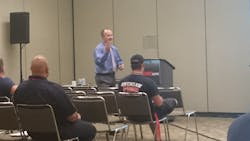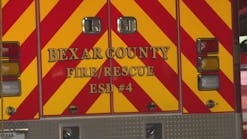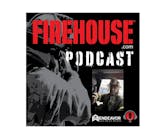FHExpo: Surviving the First Year as a Company Officer
The first year as a company officer is deemed by many to be one of the most difficult of a firefighter’s career. The transition “from buddy to boss” can be bumpy, learning how to lead your team from a position of authority while still being able to be connect with them on a personal level.
In his Thursday afternoon session “First Steps: The First Year as a Company Officer” at Firehouse Expo, Jonah Smith, a captain with the Charlotte, N.C., Fire Department, described some of the keys to a successful transition. I had the opportunity to catch up with Captain Smith before the show.
The interpersonal side
Smith explains that part of the reason he wanted to tackle this topic was because there simply isn’t enough education about the interpersonal side of becoming a company officer. “At the certification level, we hope to prepare officers for what may be the biggest adjustment in the fire service—where you become a supervisor,” he says. “But we fail to give effective interpersonal dynamic education in these classes. We tell them you are in charge, but you have to be a buddy, too.”
Smith says one of the hardest parts about the transition is the reluctance to step back and let others do the work. Firefighters are used to working—and doing things a certain way—so if a member of their crew isn’t doing their job, it’s easy for a new company officer to jump in and do it for them. Smith advises that while it’s important to stay in touch with the work side, it’s also critical to start teaching others how to do that work so they learn and you don’t get pulled in too many directions.
Another important point is that you have to accept that you can’t make everyone happy all the time—but you can still have a happy crew. A key to that is treating your crew like your family. “Everyone wants us to be a team,” Smith says. “I venture to say that we have to be a family—to suffer together, to celebrate together.” He argues that when you treat each other like family, it builds trust in each other and also fosters a sense of give and take where everyone knows that the others have their backs and will step in to help when necessary.
None of this works, though, if you aren’t real with each other. “Firefighters talk about everything … and if you put on a façade that you’re some big, tough guy and you aren’t, you won’t be respected or trusted.”
Culture & expectations
An integral part of leading a crew is developing a positive culture. Smith explains that every department has people who always seem to complain—and we all want to complain sometimes—but we have to find the positive and work toward the common interest of the company. As such, Smith recommends following the “complain up, praise down” principle. He says it’s important to limit how much you complain to your crew. “Nothing is more devastating to a company than a negative leader,” he says. So instead of complaining to the crew, take your comments to a higher level. Not only does this keep negativity away from your crew but it means that the powers-that-be are hearing from the ranks.
One tip for maintaining a positive atmosphere is to build your own personal informal advisory group. Smith explains that this can be a group of people who you can turn to when you have questions or complaints. It could be your dad, a friend, a fire service colleague you met at Expo—really anyone whom you can talk to about the day-to-day issues of being both a buddy and a boss. “Instead of flying hot and calling the chief, you have a good group of people to turn to,” he says.
Another part of building a positive culture in the department is developing realistic expectations, both for yourself as a company officer and for your crew. As a general rule of thumb, Smith explains, expectations should be simple, measurable, meaningful, not petty and clear cut. “It sets a clear line and creates consistency,” he adds.
Tactics & training
Company officers can probably spend all day dealing with interpersonal issues at the station, but they still need to be able to “walk the walk,” as they say, to build trust and respect. “If firefighters trust you on the fireground, they will trust you to steer them correctly,” Smith says. In other words, keep your skills honed.
Further, part of your job is to determine the tactical proficiencies (aka strengths) of your crewmembers. “Every person on the truck has a talent, and that person can share their knowledge with the others to develop their strengths,” Smith says. This knowledge sharing is easily worked into training.
When it comes to training, Smith urges company officers to encourage input from their crewmembers. Additionally, he recommends sharing training ideas with neighboring departments. For example, someone from the neighboring station may call and say they want to hear about something happening at your department, perhaps a training evolution, so you teach a class at that station to build their training catalog. “You become an advisor to others who care, and it creates others who care—it’s a cascading process,” he says.
In sum
The first year as a company officer won’t be easy, but if you remember some of the key tenets—be consistent, make good decisions, maintain your tactical proficiency, stay close with the crew, and keep training—Smith says, the road will be a little less bumpy.

Janelle Foskett
Janelle Foskett served as editorial director of Firehouse Magazine and Firehouse.com, overseeing the editorial operations for the print edition along with working closely with the Web team.






